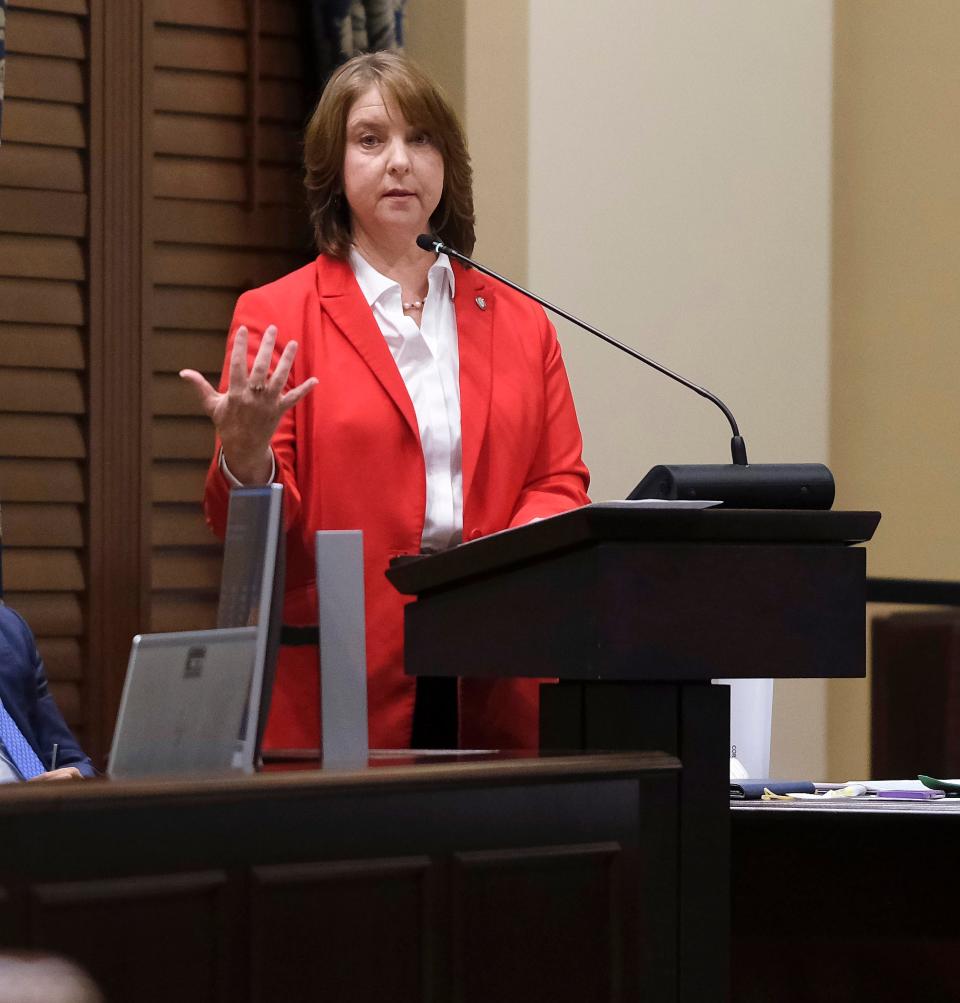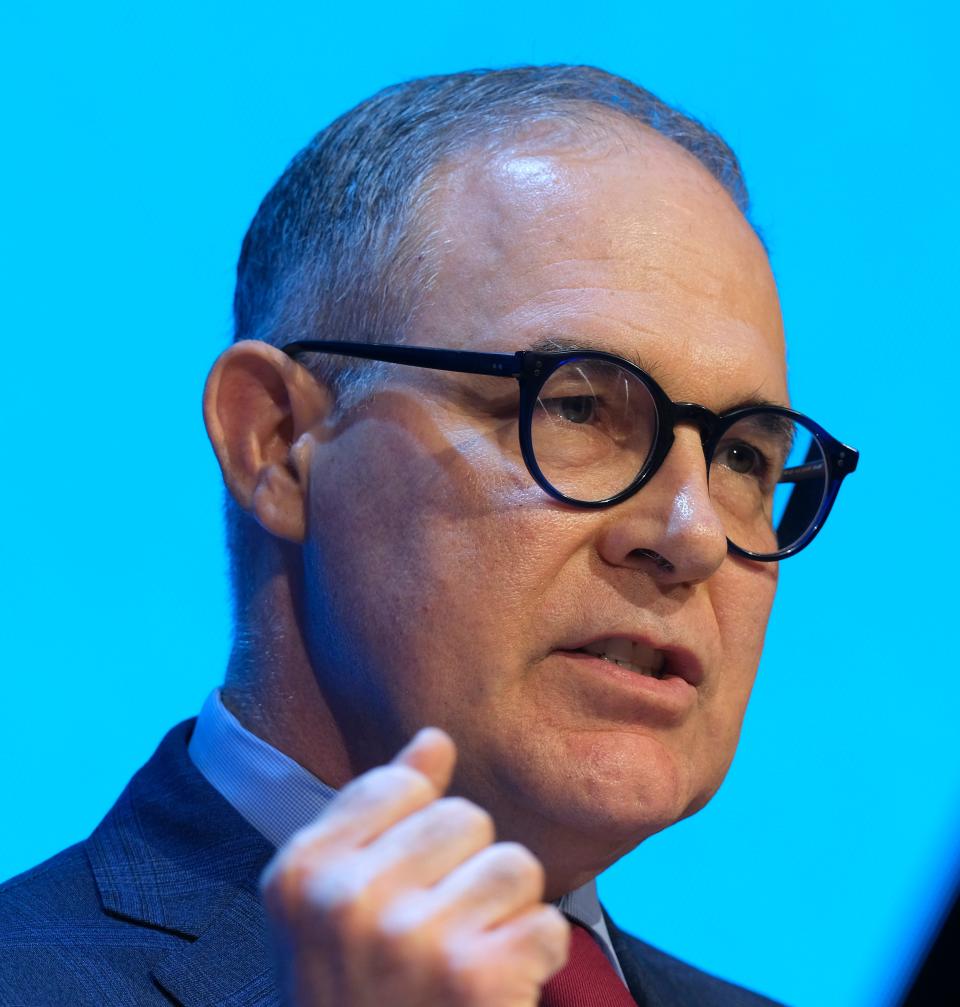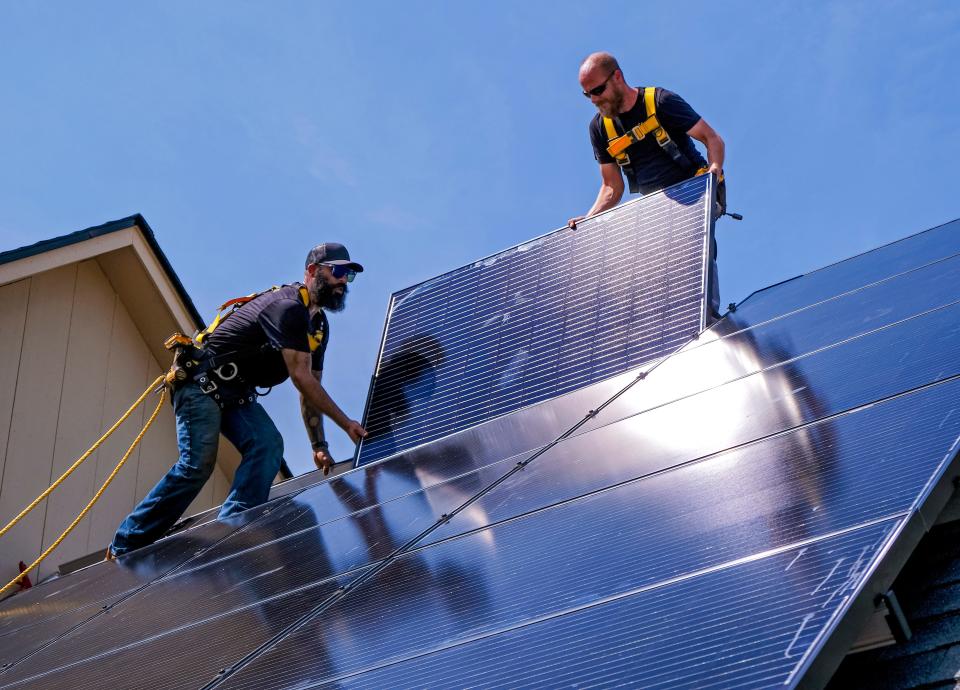For Stitt, climate change is less threat and more business opportunity
- Oops!Something went wrong.Please try again later.
Speaking to more than 100 state government officials from across the western United States, Gov. Kevin Stitt listed off the ways Oklahoma had embraced renewable energies and a "greener" future.
The state's electricity grid offers businesses some form of carbon neutrality, the number of charging stations spread out along highways can serve thousands of electric vehicles and a plan to create a new hydrogen energy hub will help the nation move away from fossil fuels, Stitt said at the Western Governors Association's May meeting in Oklahoma City.
While Stitt peppered in talk about "freedom" and the state's conservative way of life, the parts of his speech on energy sounded more in line with a coastal Democratic, not a Republican governor from an oil and gas-rich state.
“Most Republican governors would not tackle that, but as a business person ... you're looking at where the investments are heading," Stitt told The Oklahoman after his address, acknowledging an economic shift underway in an effort to respond to manmade climate change.
Stitt believes the climate is changing but has downplayed the scientific consensus that it is threatening the planet — “It doesn’t mean it’s an existential threat. What does that even mean?” Stitt asked while speaking at the 2019 Southern States Energy Board meeting.
But while Stitt might not view the climate change threat as real, he has spent much of his first term in office fully embracing the climate change economy by working to carve out a place for Oklahoma in a world that is increasingly moving away from fossil fuel-dependent sectors.

"We definitely are a state that is trying to cash in on climate change," said Sen. Mary Boren, a Democratic lawmaker from Norman who is the state lead for the National Caucus of Environmental Legislators.
"If we acknowledge climate change exists by making money from it, maybe we will acknowledge it exists and try to stop it."
Climate change is intensifying extreme weather in Oklahoma
Numerous scientific studies have found manmade climate change is already having an impact on Oklahoma, including prolonged drought and record-setting temperatures in both the summer and winter.
Extreme heat is an increasing risk to Oklahoma as days exceeding 100 degrees are expected to nearly double in some parts of the state within 30 years, according to a national climate study by First Street Foundation. Farmers and ranchers have experienced hay shortages and tougher crop conditions, consumer utility prices have increased and wildfires have become harder to control.
More:Higher-than-normal temps hit OKC this summer
"Nine of the last 12 months have seen above average temperatures, and that has not really been acknowledged by this administration. We are just told this is normal," said Cheyenne Branscum, chair of the Sierra Club's Oklahoma chapter.
"We haven't really seen a change in our leaders (acknowledging climate change). What has changed is we are really feeling the effects of climate change now."
Stitt isn't the first Oklahoma politician to mock or downplay the scientific consensus on climate change.
U.S. Sen. Jim Inhofe famously brought a snowball into the U.S. Capitol in an attempt to discredit the idea of a warming planet because of a February snow in Washington.

Former Attorney General Scott Pruitt was tapped by former President Donald Trump to lead the EPA, an agency he worked to severely limit before scandal forced him from the office.
Stitt’s recently appointed secretary of energy and environment, Ken McQueen, said climate change was “just part of the history of the world we live in,” when speaking in 2015 to a state senate committee in New Mexico.
Environmentalists say the state government needs to do more to prepare for climate change's impact and increase resources that assist in relief efforts following extreme weather events, which are increasing.
Economic shift driven by climate change offers business opportunities
The fact that climate change's impact has not been top of mind for Oklahoma's political leaders isn't too surprising given the partisan split over how many view the issue. While a majority of Americans believe climate change is a significant threat — 54%, according to Rew Research Center — most Republicans do not.
But an increasing number of corporations, Democratically controlled states and the Biden administration are trying to push the economy toward renewable energy, and it's a shift Stitt has tried to capitalize on.
More:What to know about Oklahoma's embrace of the electric vehicle industry
One of the biggest economic shifts underway is the move toward electric vehicles from gas-dependent vehicles, which account for nearly one-fifth of all emissions in the country, according to the Environmental Protection Agency.
A new energy and climate package approved this year by Congress offers tax credits to electric car buyers and puts in place new made-in-America standards for some vehicle parts.
Add in the fact that California, the largest buyer of new vehicles, will require all new cars, pickups and SUVs to be either electric or hydrogen-powered by 2035, and auto manufacturers are increasingly looking to expand electric car factories and other facilities that produce batteries.
For Stitt, the growing electric car market is one he wants Oklahoma to tap into.
“The investments are heading to electric vehicle manufacturing, battery manufacturing technology, alternative (energies),” Stitt said.
Stitt has pushed for the state to spend billions of dollars in tax incentives for the electric vehicle industry, including nearly $700 million the governor got lawmakers to approve this year in hopes that Pansonic would bring an electric vehicle battery plant.
Stitt is still a defender of oil and gas
Despite Stitt's embrace of the "green" energy economy, he has remained a consistent defender of fossil fuels.
"We love our oil and gas industry," Stitt said last month on a conservative podcast. "You can't have an intellectually honest conversation about the needs of Americans and a reliable energy grid without talking about natural gas and talking about oil."
Stitt has accused President Joe Biden of being the first president in nearly 50 years to not have an "energy independence policy," an ambiguous phrase used by many Republican officials this year to criticize the administration for high gas prices.
The U.S. has long relied on importing oil and gas, including under the Trump administration, and Biden, like other presidents, has called for more energy independence.
Stitt also has criticized Biden's efforts to address climate change, but recent bills passed under his administration could benefit Oklahoma and the governor's own economic strategy.
Earlier this year, Oklahoma joined Arkansas and Louisiana in creating a regional hydrogen hub, and applied to the U.S. Department of Energy for nearly $1 billion in funding support.
“These hydrogen hubs will make significant progress towards President Biden’s vision for a resilient grid that is powered by clean energy and built by American workers," said U.S. Secretary of Energy Jennifer M. Granholm.
More:Oklahoma joins neighbor states in quest for dollars to prove hydrogen's worth
A state task for recently issued a report that claimed the hydrogen industry could pump between $1.5 billion and $2.5 billion into the Oklahoma economy, especially if the new regional hub takes off.
Oklahoma is also poised to benefit from the recent Inflation Reduction Act, which includes significant funding and policy changes related to climate change mitigation.
More:Can Biden's climate bill actually help Oklahoma's energy strategy? Here's why it might
Not only does the bill include millions of dollars to help the state clean up orphaned oil wells, but tax credits hoped to build up the types of renewable energy infrastructure the state is investing in.
"Battery infrastructure is incentivized through this bill. Clean energy, EV components are incentivized through this bill. And these are organizations that the Stitt administration has tried to attract to the state," Travis Roach, an economist and professor at the University of Central Oklahoma, told The Oklahoman.
Despite the state's growth in renewable energy — about 40% of Oklahoma's electricity is generated from wind power — Boren, the senator from Norman, believes more can be done.

"We have a lot of solar power vendors who are ready to hire people and start building, but we still have a lot of governmental barriers that prevent us from building that industry in Oklahoma," Boren said.
Boren has pushed for bills that would allow clean energy companies to gain access to more information from utilities, and allow schools to use bond funds to build solar panels.
Neither of those efforts has been successful, but Boren said she is hopeful more companies in the state will demand an increase in renewable energy.
"Unfortunately, in this state, things don't get done unless company executives are demanding change," Boren said. "We prioritize corporation priorities for most policies, so anything related to addressing climate change is going to have to be business driven.
"The (governor) sees that growing demand and the economic opportunities, which is a start."
This article originally appeared on Oklahoman: Oklahoma Gov. Stitt is trying to cash in on the climate change economy

